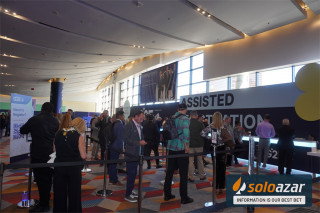Sports betting’s next five years promise a tech-driven boom
Monday 15 de May 2023 / 12:00
2 minutos de lectura
(Washington).- Since the Professional and Amateur Sports Protection Act (PASPA) was repealed on May 14, 2018, sports betting has transformed the fan experience across the U.S. Yet, with sports betting currently legal and live in just 33 states and Washington, D.C., we still have a great deal of opportunity before us.

I have a unique view of the industry, growing up in Australia, which has had legal sports betting for decades. When I moved to the U.S. in 1996, I saw betting lines in major newspapers and commentators subtly referencing them in broadcasts. I called the sports desk of a major NYC newspaper and asked where I could place a bet based on the lines they published. I can still hear their laughter as they hung up the phone. I realized then that in the States, sports betting was everywhere but nowhere at the same time.
Five years after the Supreme Court struck down PASPA, significant strides have been made in establishing legal U.S. sports betting, with much of the progress thanks to the American Gaming Association (AGA), which has steered stakeholders towards establishing a strong, regulated and sustainable industry that is currently valued at north of $9 billion. But, reflective of how nascent it truly is, the industry been projected to reach $20 billion by the end of the decade as technology unlocks new engagement opportunities and new states come online.
Last year alone, Americans wagered $95 billion on sports within legal, regulated jurisdictions that provided tax benefits to communities and featured safeguards and support for the consumer. That staggering amount is more than we spent on ride sharing ($90 billion), coffee ($80 billion) and streaming ($70 billion) last year.
And it’s truly a pastime. The majority of sports bettors (56%) say they bet because of the entertainment value, while 42% say they do it because “it makes games more exciting.” These aren’t sharps: About 85% of bets made in the U.S. are less than $5. This is evidence of the emergence of the “recreational bettor,” someone who places a wager as an aspect of their fandom.
The best illustration of the impact of this industry-altering convergence is the how betting has changed the way sports are consumed. Fans are demanding more information, faster, so they can confidently place their bets. Consequently, it’s become the norm for media outlets to feature lines, discuss player props or use betting-oriented analytics to create contextual subject matter in a broadcast. Sportsbooks, meanwhile, have embraced content as way to engage and retain fans on their own platforms by launching their own OTT channels and podcast networks.
What can we expect in the next five years?
At Sportradar, we’re hyper-focused on supporting leagues, teams, sportsbooks and media companies through the application of technologies like AI and computer vision to automate data capture. This in turn will accelerate and sharpen data curation and ultimately its distribution downstream. Sportsbooks will benefit from greater predictive accuracy, which will aid in the development, management and fine-tuning of the markets they offer to their customers. At the same time, broadcasters and media companies will gain by being able to offer richer storytelling through deeper insights related to the action on the field of play.
We’re in a digital-first, highly connected culture, coupled with an on-demand consumer mindset that resulted in 90% of bets being placed on mobile in 2022. Moving forward, integration of betting widgets into mobile streams and a maturing sports betting marketplace will normalize in-play, wherever-you-watch, on-the-go betting—accelerating growth and increasing the resulting handle.
Additionally, the industry has its eyes on three large states—Florida, Texas and California—that have yet to open. Last November’s failure at the ballot box in California was a disappointment, but when it launches, California will be huge, with estimates of upwards of $30 billion in handle (almost one third of what was bet in the U.S. last year).
Finally, the industry has recognized that the future of sports betting in the U.S. will not consist of more of the same type of fans. We have ignored an entire audience segment of women bettors, as well as all consumers wanting to bet on women’s sports, but the momentum is growing. FanDuel saw the WNBA generate significant interest last summer, increasing 270% in bet count and 101% in handle from 2021, while DraftKings saw bets on women’s sports increase by 61% from 2021 to 2022. Global Wireless Solutions found the number of female users who joined sportsbook apps grew 45% in 2022, outpacing the growth rate in new male users for the third year in a row. It’s clear this is an untapped and underserved market.
As a responsible steward at the center of the industry, and with more than 20 years of global experience, we at Sportradar know the keys to the U.S. sports betting market reaching its potential: always putting fans first, committing to a responsible environment featuring consumer safeguards and support, and leveraging technology to enhance the fan experience.
Here’s to the next five years—and beyond.
Bimson is responsible for setting the vision for Sportadar’s continued growth within the U.S. market, nurturing partner and client relationships and working closely with the North American executive team to identify revenue accretive opportunities. Before joining Sportradar, he served as global head of business operations & analytics for Bloomberg’s marketing division.
By Andrew Bimson
Categoría:Analysis
Tags: Sports Betting, Sportradar, Sportsbook ,
País: United States
Región: North America
Event
G2E - Las Vegas 2025
06 de October 2025
CT Interactive on Innovation, Networking, and Market Growth at G2E 2025
(Las Vegas, SoloAzar Exclusive).- The global gaming industry marked G2E’s 25th anniversary with a major gathering in Las Vegas. CT Interactive stood out for its innovative product development and international growth strategy. Account Manager LATAM at CT Interactive, Roberto Muñoz, shared insights on G2E’s importance, emerging trends, and the company’s collaborative expansion efforts.
Thursday 30 Oct 2025 / 12:00
Atlaslive Explored the Future of Gaming in Latin America at Recent G2E 2025
(Las Vegas, SoloAzar Exclusive).- Bruno Almeida, Head of Sales LATAM at Atlaslive, attended G2E for the first time to explore how land-based and online gaming are converging. His experience highlighted key trends shaping the Latin American market, from immersive casino innovations to strategic networking and regulatory insights.
Monday 27 Oct 2025 / 12:00
G2E 2025: Cristian Galarza, ASAP Director Explains the Importance of Attending the Event
(Las Vegas, SoloAzar Exclusive). - After attending the 25th anniversary edition of G2E in Las Vegas, ASAP’s director shares his perspective on the evolution of the industry, driven by digitalization, efficiency, and the creation of international networks that foster new business opportunities.
Tuesday 28 Oct 2025 / 12:00
SUSCRIBIRSE
Para suscribirse a nuestro newsletter, complete sus datos
Reciba todo el contenido más reciente en su correo electrónico varias veces al mes.



























